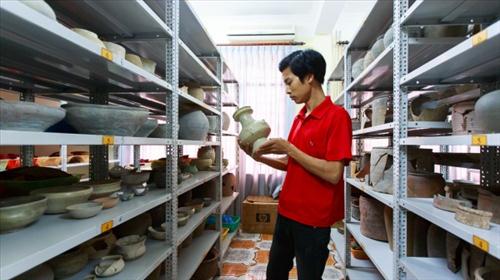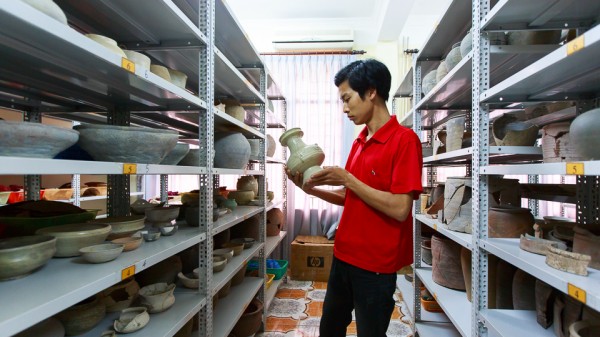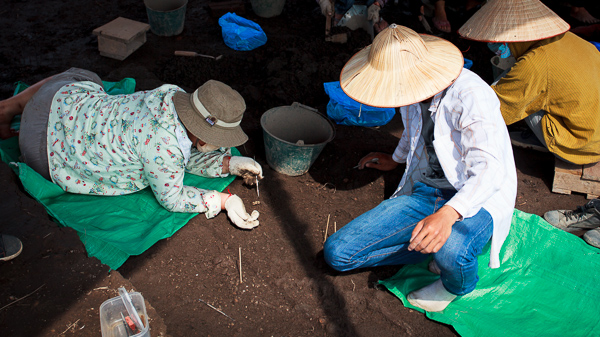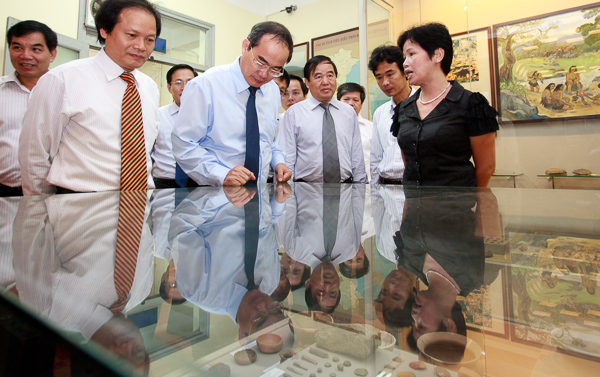

To date, the Department of Archaeology at the University of Social Sciences and Humanities is almost the largest training institution in the country, providing up to 90% of the workforce in this field for research institutes, museums, heritage management boards, and many cultural and tourism agencies.
Modern and interdisciplinary science
Compared to other social sciences and humanities disciplines, archaeology is one of the oldest in Vietnam. Before 1954, archaeological activities in Vietnam and Indochina were carried out by French scholars. In the 1960s, the Department of Archaeology was established within the Faculty of History at Hanoi University, and is now the Department of Archaeology under the Faculty of History (University of Social Sciences and Humanities – Vietnam National University, Hanoi), with the dual mission of training and conducting archaeological excavations to support education. To date, the Department of Archaeology at the University is almost the largest training institution in the country, providing up to 90% of the workforce in this field for research institutes, museums, heritage site management boards, and many cultural and tourism agencies.
“Many people think that archaeology is a somewhat outdated field, or simply about ‘excavation,’ but that’s a very simplistic and ‘crude’ way of thinking,” said Associate Professor Dr. Lam Thi My Dung. “In reality, it is an interdisciplinary, modern science with great potential and is very easy to integrate and interact with the world.”
Associate Professor Lam Thi My Dung also added: Previously, the world considered Archaeology as a specialization within Historical Sciences – a science that studies the past of humankind based on historical data, which are the material remains left by humans in the ground and on the surface. Some places classified Archaeology as a specialization within Anthropology, meaning it not only reconstructs the picture of the past according to the flow of history but also raises many issues related to the lifestyle and behavior of our ancestors towards the natural and social environment.
Archaeology is a field of study with great potential for development, because the need to understand past life in order to extract knowledge and cultural values for the present is an eternal need. In fact, many countries have been very successful in applying archaeological science to reconstruct the origins and unique values of their culture and nation, thereby exploiting economic, tourism, and social benefits. Archaeology is a very fundamental field of study, providing knowledge and understanding to many other scientific disciplines. With its important contributions, archaeology has developed into many specialized fields such as: urban archaeology, agricultural archaeology, environmental archaeology, marine archaeology, etc.
Associate Professor Lam Thi My Dung affirmed that overseas training is almost a mandatory requirement for research and teaching staff in the Department, and more broadly for archaeologists in Vietnam. This is because modern archaeology utilizes many of the latest advancements in science and technology: processing software, measuring instruments, genetic technology, DNA, 3D techniques, etc. Archaeologists need many skills, from drawing and using maps to photography, videography, and computer processing. Excavation is only one stage; more important is the way to process and evaluate the information gathered to arrive at valuable conclusions. Therefore, archaeologists need a very broad foundation of knowledge, encompassing both social sciences and humanities and natural sciences. It is even better if they also have an aptitude for technology and engineering.
When we raised concerns about career opportunities for Archaeology students in Vietnam today, the Head of Department confidently asserted: "Almost 100% of graduates find jobs in their field, and even before graduation, many agencies and organizations approach them with recruitment offers. This is because the demand for personnel in this field in our country is very high, while the number of graduates each year is very limited."
Organizations and institutions in need of students specializing in this field include the Institute of Archaeology (under the Vietnam Academy of Social Sciences), the National Museum (formerly the Vietnam History Museum), and other archaeological management agencies such as local museums and heritage site management boards. In addition, many tourism companies and organizations also require Archaeology graduates. Notably, since 2001, the State has enacted the Law on Cultural Heritage with clear regulations on the standards for personnel working in the field of Archaeology. This further opens up significant job opportunities for students specializing in this field.
Associate Professor Dr. Lam Thi My Dung also highly praised students who chose Archaeology, saying: “While many students are still quite passive and hesitant in choosing their major, students in Archaeology are usually very aware of the career they want to pursue. From their first year in the Faculty, they have participated in fieldwork and archaeological internships, understanding the difficulties and hardships of the profession and determined to pursue it. These are truly young people with a great passion for national culture and a desire to explore the mysteries of history and the past.”

Faculty and students of the Department of Archaeology working at the Vuon Chuoi mound site (Lai Xa village, Kim Chung commune, Hoai Duc district).
Students in the History Department, starting from their third year, can choose to specialize in this field if they meet the academic requirements. For the first three years, students study general history. In their fourth year, they learn specialized knowledge such as the fundamental characteristics of Vietnamese and world archaeology, the latest archaeological achievements, etc.; and receive guidance from lecturers on practical issues in the field. In addition, the Department focuses on training students in excavation skills, fieldwork, work organization, and developing their ability to work independently.
Archaeology students are also very proactive in seeking professional experiences from their second and third years. Many have had the opportunity to accompany expert teams from both within and outside the country on archaeological excavations in numerous large-scale projects. All these advantages help students to be well-prepared for future jobs.
Currently, the Department of Archaeology (Faculty of History – University of Social Sciences and Humanities) is the only training institution that has fully developed a training system from undergraduate to postgraduate and doctoral levels in the field of Archaeology. The Department's training program is updated and developed based on experiences from many countries such as France, Russia, and the United States. The Department has also expanded its cooperation with many major universities around the world with highly developed archaeology departments, such as Seoul National University (South Korea), Kanazawa University (Japan), Sun Yat-sen University (China), and the Archaeological Institute of the Federal Republic of Germany. Many large-scale collaborative projects have been implemented, such as the AMS dating project of the Hoa Binh culture with Seoul National University, the Sa Huynh culture research project with the German Archaeological Institute, and the Cultural Heritage Training and Research Project with Kanazawa University. Domestically, the Department's team of experts and scientists has contributed significantly to the discovery and excavation of many archaeological cultures in the country. The recognition of Hoi An, My Son, and Hue Imperial City as World Heritage sites is also largely thanks to the efforts of the Department's faculty members.

Deputy Prime Minister Nguyen Thien Nhan visited the Museum of Anthropology (University of Social Sciences and Humanities). Established in March 2005, the museum was built on a collection of archaeological artifacts collected over many years by lecturers and students of the Archaeology Department from all three regions of Vietnam: North, Central, and South.
Most recently, Associate Professor Dr. Lam Thi My Dung was invited by Kanazawa University (Japan) to teach and participate in the Graduate Program in Cultural Resource Management. The project involves universities from Japan, China, Thailand, Vietnam, and Indonesia. Kanazawa University also offered one to two scholarships from the Japanese Government for graduate students and researchers from our university to participate in this project. The scholarship is worth 160,000 yen per month, with a duration of 2 to 4.5 years. Applicants must meet the requirements of a university degree in Archaeology or related cultural fields, possess good English proficiency, and pass a professional interview with the partner institution. In 2012, a staff member from our department was accepted into this program.
“This is a wonderful opportunity for students and trainees majoring in Archaeology at the University to study in the most advanced environments, participate in practical excavation activities, and learn from the experience of foreign experts,” said Assoc. Prof. Dr. Lam Thi My Dung. “In addition, the Department also has a new opportunity to elevate its status and integrate with world archaeology.”
|
Admission information
Students in the History Department from their third year onwards can register to choose to specialize in Archaeology if they meet the academic requirements. |
Author:Thanh Ha
Newer news
Older news